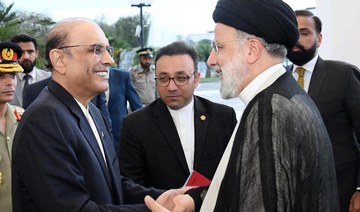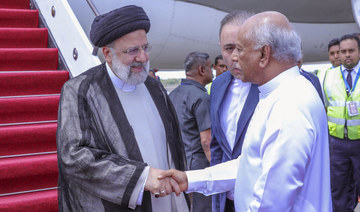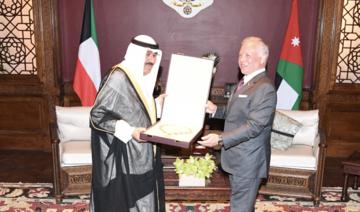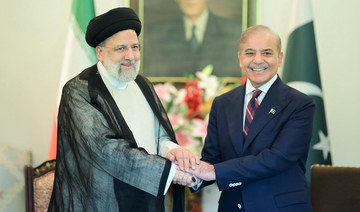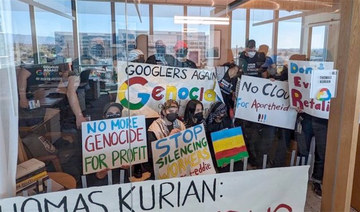DUBAI: Seeking to bolster its image as a forward-looking metropolis, Dubai hosted the largest-ever international robotics contest this week, challenging young people from 190 countries to find solutions to global ocean pollution.
Event organizers say their selection of Dubai as host reflects a vote of confidence that this oil-rich Emirati sheikhdom can be a global hub for innovation. They also expressed hope that bringing together tomorrow’s scientists and engineers will help develop technologies to solve the world’s most pressing issues, particularly those related to the environment.
Dean Kamen, founder of FIRST Global Challenge, said the Middle East represents a part of the world where “the adults have not learned how to play nice with each other” and it was up to young people to fix humanity’s self-inflicted wounds.
“We are in an accelerating race toward catastrophe, whether it’s global warning, melting of the (polar ice) caps, bird flu, terrorism — you name it, we’re worried about it. The solution to most of the world’s grand challenges depends on better technologies than we have today,” he said.
“This globe of ours is on life support, so the thought is we get every kid in every country to focus on learning how to use technology, but focus on using it as a tool and not a weapon,” he explained.
The unofficial “Robotics Olympics” seeks to encourage young people to pursue subjects known as STEM — science, technology, engineering and mathematics. Teams of four to five students, aged 14-18, each received a kit of rods, wheels, wires and other raw materials with which to assemble their roving robots. Their task: Collect orange balls of various sizes from a playing field, which represented human-created pollutants in the ocean. Some devised robots for scooping, while others snatched up and fired the balls through the air into the receptacles.
The teams then formed “alliances,” each with up of four nations, to battle their way to the final round. Overall, 1,500 students took part.
A team captained by Belarus, and including Syrian refugees, eventually won the gold medal, edging out a team captained by Israel in a dramatic final match. But organizers stressed a message of unity, not conflict.
“The kids get it. To them this isn’t a competition; this is a ‘coop-etition.’ This is a celebration of technology,” said Kamen.
Previous events tackled challenges related to clean water access and sustainable energy.
Robotics is a natural fit for Dubai, a city that’s already testing driverless cars and taxis. It’s become a magnet for international entrepreneurs, with an entire zone called “Internet City” that’s packed with high-tech startups. Next October, Dubai will host the Expo 2020, welcoming technological breakthroughs from around the world.
“If we are to become the city of the future, we need to have the right talent from around the world,” said Omar Al-Olama, the 29-year-old Emirati Minister of Artificial Intelligence, the world’s first such minister. “Artificial intelligence is based on data. Data is what drives all these new technologies. We have the holy grail of data. We have 200 nationalities represented in this country.”
FedEx recently announced Dubai would become the first city outside the US to test Roxo, an autonomous delivery device that can travel on sidewalks and even unpaved surfaces.
Roxo made its debut international appearance at this week’s robotics contest, drawing the interest of the tech-savvy teens hailing from places as diverse as Afghanistan to Zimbabwe. They mingled in Dubai’s Festival City, exchanging experiences and forming friendships while talking shop about their gadgets.
“We didn’t do so well in the matches because we had a lot of trouble with the control hub, but it doesn’t matter, we had a lot of fun,” said Stefan Sijbesma, 17, from the Netherlands. “For me, robotics is really important because it really helped me choose what I want to study and what I want to do with my life.”
The three-day tournament had a festival-like atmosphere to it, with announcers and commentators analyzing the action in sports-broadcast style and fans waving flags and banners supporting their teams. The pavilion floor was filled with facts about the millions of tons of pollutants threatening the world’s oceans, and featured slogans such as “united by land, connected by oceans” and “together we turn the tide on pollution.”
As the nail-biting results were being announced, the Israelis huddled with their Ugandan teammates before embracing the winning team in a feel-good ending.
“I can’t believe it, it’s a miracle,” said Yamen Najjar, manager of Team Hope, which represents the Syrian refugees and was part of the winning alliance. “It was a very difficult competition for us, we faced a lot of problems, but we didn’t lose hope.”
Outgoing US Energy Secretary Rick Perry, who’d made the original announcement that Dubai would host the event earlier this year in a surprise visit to the World Government Summit, was on hand. Perry said he’s followed the robotics tournaments since 2002 when, as governor of Texas, he attended one of the regional competitions in Houston and was “blown away” by the passions and abilities of the young contestants.
But he said he found their camaraderie even more impressive.
“It is stunning what these young people are doing,” Perry said. “Where the adults may have failed in the standpoint of international diplomacy, these young people may accomplish, and if that’s the case maybe that is the most important thing that comes out of this.”
Dubai displays tech reputation with global robotics contest
Dubai displays tech reputation with global robotics contest
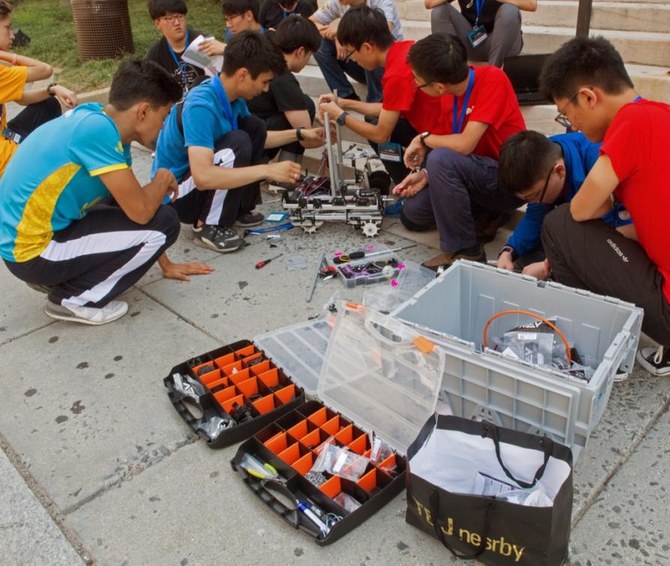
- Dubai would become the first city outside the US to test an autonomous delivery device named Roxo
- Around 1,500 students participated in the competition
Iran cuts Syria presence after strikes blamed on Israel: monitor
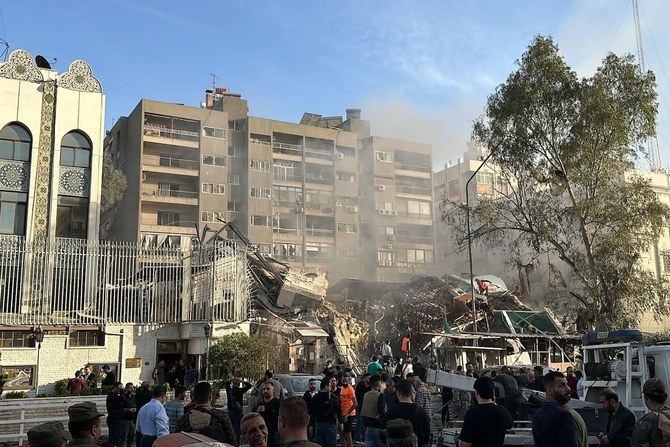
- Iran withdrew its forces from southern Syria, including both Quneitra and Daraa provinces
- Iran has said repeatedly that it has no combat troops in Syria, only officers to provide military advice and training
BEIRUT: Iran has reduced its military footprint in Syria after a succession of strikes blamed on Israel, a source close to Iran-backed militant group Hezbollah and a war monitor said Wednesday.
Iran has provided military support to Syrian government forces through more than a decade of civil war but a series of strikes targeting its commanders in recent months has prompted a reshaping of its presence, the sources said.
“Iran withdrew its forces from southern Syria,” including both Quneitra and Daraa provinces, which abut the Israeli-annexed Golan Heights, the source close to Hezbollah said.
But it still maintains a presence in other parts of the country, the source added.
Recent months have seen a series of strikes on Iranian targets in Syria, widely blamed on Israel, culminating in an April 1 strike that levelled the Iranian consulate in Damascus and killed seven Revolutionary Guards, two of them generals.
That strike prompted Iran to launch a first-ever direct missile and drone attack against Israel on April 13-14 that sent regional tensions spiralling.
But Iran had already begun drawing down its forces after a January 20 strike that killed five Revolutionary Guards in Damascus, including their Syria intelligence chief and his deputy, the source close to Hezbollah said.
Britain-based war monitor, the Syrian Observatory for Human Rights, said Iranian forces had withdrawn from Damascus and southern Syria.
Iran-backed Lebanese and Iraqi fighters had taken their place, Observatory chief Rami Abdel Rahman said.
Iran has said repeatedly that it has no combat troops in Syria, only officers to provide military advice and training.
But the Observatory says as many as 3,000 Iranian military personnel are present in Syria, supported by tens of thousands of Iran-trained fighters from countries including Lebanon, Iraq and Afghanistan.
Abdel Rahman said that many of Iran’s advisers had left Syria over the past six months, although some remained in Aleppo province in the north and in Deir Ezzor province in the east.
Jordan King issues decree to hold parliamentary elections - state TV
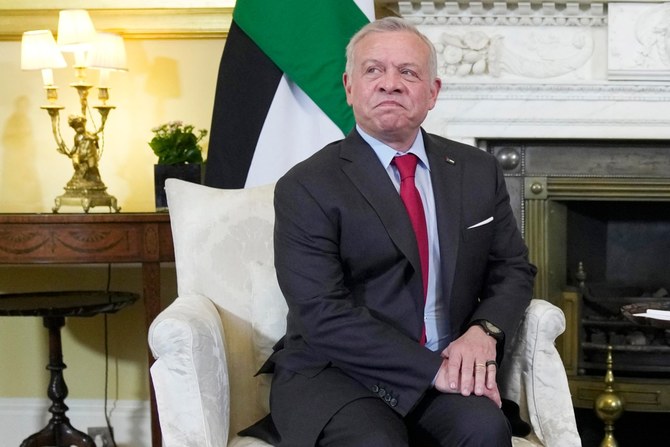
DUBAI: Jordan’s King Abdullah issued a royal decree on Wednesday announcing that a parliamentary election will be held, state TV said.
Under the constitution, the multi-party election is usually held within four months of the end of a four-year term of parliament. The country’s last election, with over 4.6 million eligible voters, was held in November 2020.
An independent election commission decides the exact date.
Iran, Pakistan urge UN Security Council to take action against Israel
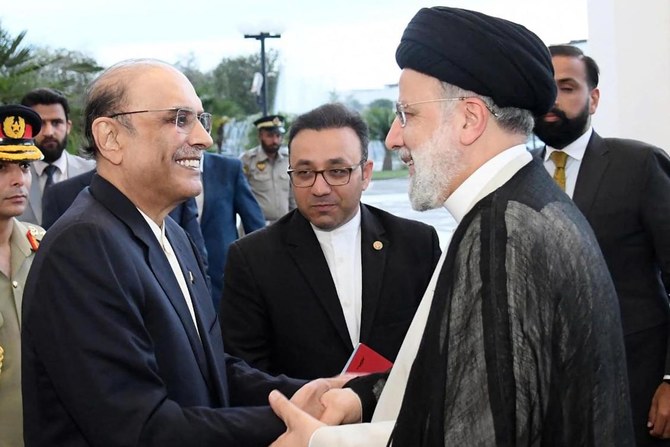
- The joint statement followed a three-day visit to the country by Iranian President Ebrahim Raisi
- Muslim neighbors Iran and Pakistan are seeking to mend ties after unprecedented tit-for-tat military strikes this year
ISLAMABAD: Iran and Pakistan called on the United Nations Security Council in a joint statement issued on Wednesday to take action against Israel, saying it had “illegally” targeted neighboring countries and foreign diplomatic facilities.
The joint statement, released by Pakistan’s foreign ministry, followed a three-day visit to the country by Iranian President Ebrahim Raisi at a time of heightened tensions in the Middle East.
Explosions were heard last Friday over the Iranian city of Isfahan in what sources said was an Israeli attack. However, Tehran played down the incident and said it had no plans for retaliation.
“Recognizing that the irresponsible act of the Israeli regime forces was a major escalation in an already volatile region, both sides called on the UN Security Council to prevent the Israeli regime from its adventurism in the region and its illegal acts attacking its neighbors...,” Iran and Pakistan said in their joint statement.
Muslim neighbors Iran and Pakistan are seeking to mend ties after unprecedented tit-for-tat military strikes this year.
Raisi, who wrapped up his visit and flew on to Sri Lanka on Wednesday, vowed to boost trade between Iran and Pakistan to $10 billion a year.
During his visit to Pakistan, Raisi was quoted by Iran’s official IRNA news agency as saying any further Israeli attack on Iranian territory
could radically change the dynamics and result in there being nothing left of the “Zionist regime.”
On April 13, Tehran launched a barrage of missiles and drones at Israel in what it said was retaliation for Israel’s suspected deadly strike on the Iranian embassy compound in Damascus on April 1, but almost all were shot down.
Pakistan has previously called for de-escalation by “all parties.”
Iran and Pakistan vowed during Raisi’s visit to boost trade and energy cooperation, including on a major gas pipeline deal that has faced delays due to geopolitical issues and international sanctions.
Lebanon’s Hezbollah says fired ‘dozens’ of rockets at Israel
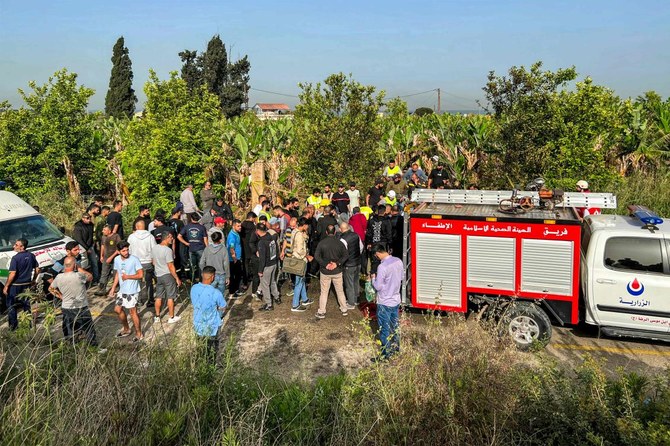
- Hezbollah has exchanged near-daily fire with the Israeli army
- Israel says 11 soldiers and eight civilians have been killed on its side of the border
Beirut: Lebanon’s Iran-backed Hezbollah movement said it fired a fresh barrage of rockets across the border on Wednesday after a strike blamed on Israel killed two civilians.
The group had already fired rockets at northern Israel late on Tuesday “in response” to the civilian deaths.
Hezbollah has exchanged near-daily fire with the Israeli army since its ally Hamas carried out an unprecedented attack on Israel on October 7, triggering war in Gaza.
It has stepped up its rocket fire on Israeli military bases in recent days.
Hezbollah fighters fired “dozens of Katyusha rockets” at a border village in northern Israel “as part of the response to the Israeli enemy’s attacks on... civilian homes,” the group said in a statement.
On Tuesday, rescue teams said an Israeli strike on a house in the southern village of Hanin killed a woman in her fifties and a girl from the same family.
Since October 7, at least 380 people have been killed in Lebanon, mostly Hezbollah fighters but also 72 civilians, according to an AFP tally.
Israel says 11 soldiers and eight civilians have been killed on its side of the border.




